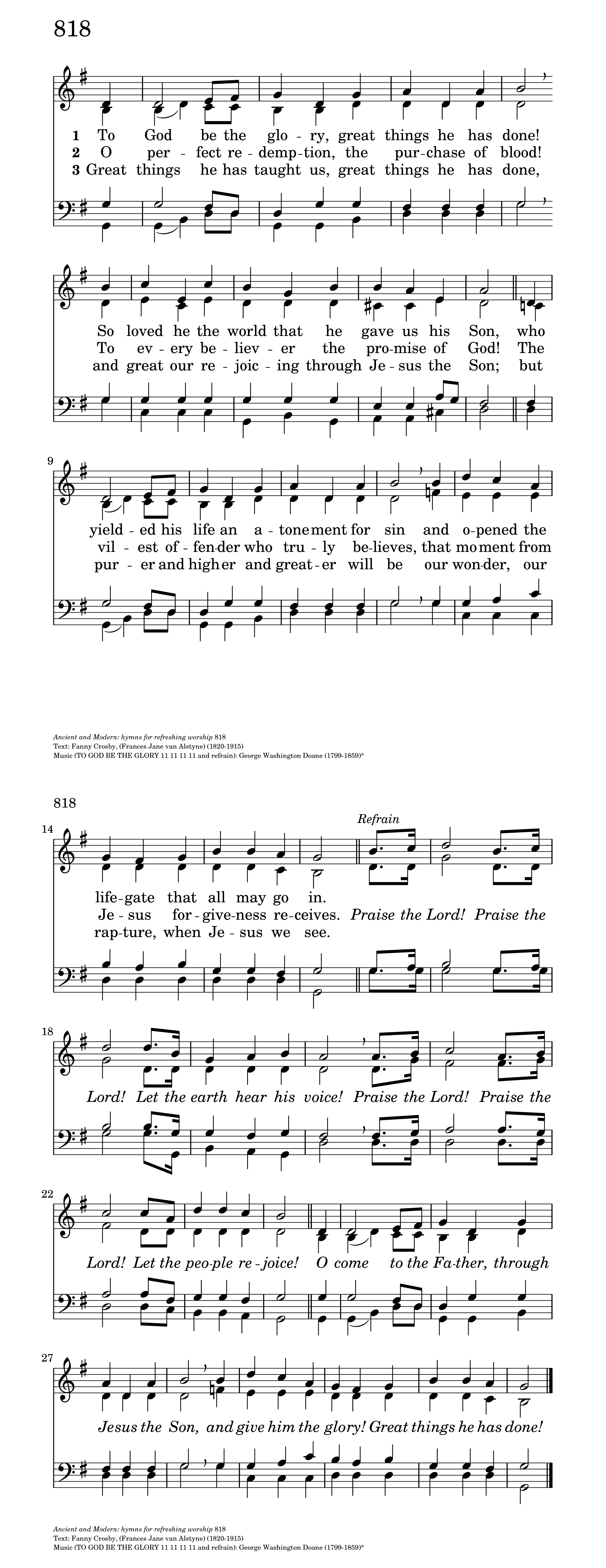Hey Sweet Friends,
Here are the resources for last week’s video.
I pray you are encouraged and love this hymn, it’s author and history as much as I do!!
Be encouraged Sweet Friends!!!
Love and prayers….k 🙂
To God Be The Glory
GodTube

“To God Be the Glory” celebrates the greatness of God and calls upon an appreciation for the wondrous things “He hath done.” It is a glorious hymn to be sung rejoicefully in the spirit of gratitude.

The Story Behind To God Be the Glory
“To God Be the Glory” is a hymn with lyrics by Fanny Crosby and music by William Howard Doane, first printed in 1875. It appears to have been created around 1872 but was published in 1875 in Robert Lowry and Doane’s hymn compilation, “Brightest and Best.In 1954, the song leader for Billy Graham was given a copy with the suggestion that “To God be the Glory” be included in the songbook for the London Crusade. It was so well-loved that he included it again later that year in the Crusade in Nashville, Tennessee. The audience responded enthusiastically and from that time on, he used it frequently. With this exposure, the hymn quickly became well-known to Christians worldwide and is printed in most modern hymnals.
Notes

Scripture References:
st. 1 = Ps. 126:2-3, John 3:16, 1 John 2:2, Matt. 7:13-14
ref. = John 14:6
Prodigious writer of hymn texts, Fanny J. Crosby (b. Putnam County, NY, 1820; d. Bridgeport, CT, 1915) wrote this hymn, which was first published with Doane’s tune in Songs of Devotion (1870). This text and “Blessed Assurance” (490) are among the best-known and most-loved hymn texts of the thousands Crosby produced. Initially ignored in the United States, the hymn was sung in British churches after its inclusion in Ira D. Sankey’s Sacred Songs and Solos (1903). Because of its use in the Billy Graham Crusades beginning in 1954, the hymn gained great popularity in Britain and Australia as well as in the United States.
In contrast to many gospel hymns (including the majority of Crosby’s texts), “To God Be the Glory” directs our attention away from personal experience to the glory of God. God so loved the world that he gave us his Son to make atonement for sin (st. 1); all who believe in Christ will receive pardon (st. 2) and will rejoice now and through all eternity because of the “great things he has done” (st. 3). The refrain borrows its praise in part from the Old Testament psalms. The phrase “when Jesus we see” (st. 3) must have meant something special to Crosby, who was blinded when she was seven weeks old.
Fanny (Francis) Jane Crosby attended the New York City School for the Blind, where she later became a teacher. She began writing poetry when she was eight and publishing several volumes, such as A Blind Girl, and Other Poems (1844). Married to musician Alexander Van Alstyne, who was also blind, Crosby began writing hymn texts when she was in her forties. She published at least eight thousand hymns (some under various pseudonyms; see PHH 427); at times she was under contract to her publisher to write three hymns a week and often wrote six or seven a day. Crosby’s texts were set to music by prominent gospel song composers such as William B. Bradbury (PHH 114), William H. Doane, Robert S. Lowry (PHH 396), Ira D. Sankey (PHH 73), and William J. Kirkpatrick (PHH 188). Her hymns were distributed widely and popularized at evangelistic services in both America and Great Britain. Crosby was one of the most respected women of her era and the friend of many prominent persons, including presidents of the United States.
Psalm 126:2-3
New American Standard Bible
2 Then our mouth was filled with laughter
And our tongue with joyful shouting;
Then they said among the nations,
“The Lord has done great things for them.”
3 The Lord has done great things for us;
We are joyful.
John 3:16
New American Standard Bible
16 “For God so loved the world, that He gave His only Son, so that everyone who believes in Him will not perish, but have eternal life.
1 John 2:2
New American Standard Bible
2 and He Himself is the [a]propitiation for our sins; and not for ours only, but also for the sins of the whole world.
Matthew 7:13-14
New American Standard Bible
The Narrow and Wide Gates
13 “Enter through the narrow gate; for the gate is wide and the way is broad that leads to destruction, and there are many who enter through it. 14 For the gate is narrow and the way is constricted that leads to life, and there are few who find it.
1 John 2:2
New American Standard Bible
2 and He Himself is the [a]propitiation for our sins; and not for ours only, but also for the sins of the whole world.
